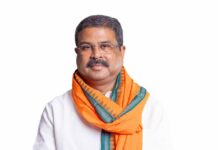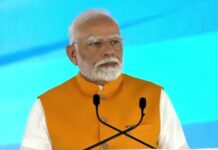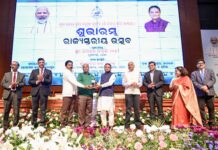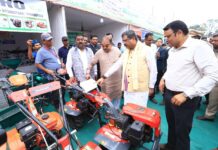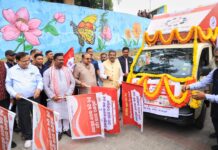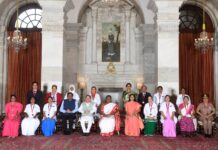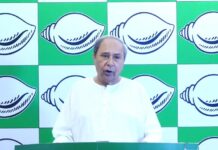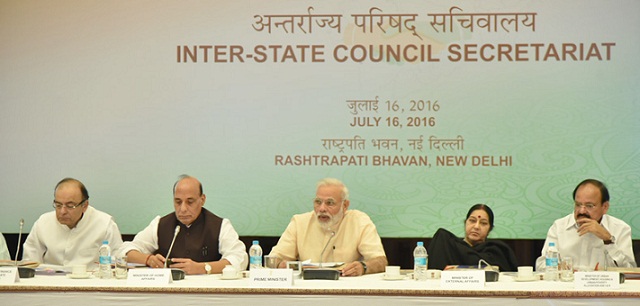
By Press Information Bureau
NEW DELHI: The Prime Minister Narendra Modi on Saturday addressed the Inter-State Council here. There are only a few occasions when the leadership of the Centre and the States, assembles together. This forum of cooperative federalism is the perfect setting to deliberate on the interests of the people, address their problems, and take collective and concrete decisions. It highlights the vision of the makers of our Constitution, the PM said.
Let me begin by recalling what our beloved former Prime Minister Shri Atal Bihari Vajpayee ji had said at this very forum sixteen years ago: “In a democracy as big and diverse as ours, debate, deliberation and discussion help evolve policy that relates to the ground reality. More importantly, they enable the effective implementation of such policies.
The Inter-State Council is an inter-governmental forum that can be used for evolving policy as well as ensuring its implementation. I, therefore, urge the States to increasingly use this forum as an effective instrument to strengthen our democracy, our society and our polity.”
The Inter-State Council is certainly the most significant platform for strengthening Centre-State and Inter-State relations. There has been a long hiatus since the last meeting in 2006, but I am happy that through the efforts of Home Minister Rajnath Singh ji, the process has been restarted. Over the last one year, he has convened meetings of five zonal councils. The increased dialogue and connect has culminated in this gathering today.
The nation can progress only if the Union and State Governments walk shoulder to shoulder. It would be difficult for any Government to successfully implement a scheme on its own. Therefore, provision of adequate financial resources is as important as the responsibility for implementation.
With the acceptance of the 14th Finance Commission recommendations, the States’ share in central taxes has increased from 32 per cent to 42 per cent. This means that States now have greater financial resources to utilize in accordance with their requirements. I am happy to share that the total amount received by States from the Centre during 2015-16 is 21 per cent higher than the amount received in 2014-15. Similarly, Panchayats and Urban Local Bodies will receive 2.87 lakh crore rupees during the period of the 14th Finance Commission, which is substantially higher than last time, he said.
The rights of States have been kept in mind, even in revenue received from the auction of natural resources, Auctions of coal blocks will yield 3.35 lakh crore rupees to States in the years to come. Auctions of other mines will yield an additional 18,000 crore rupees to states. Similarly, through amendments to CAMPA Act, we are attempting to free up about 40,000 crore rupees lying idle in banks, for disbursal to States.
The Union Government also wishes to share with States, the amount that is being saved as a result of transparency being introduced into the system. Kerosene is one example. Electricity connections are increasing in villages. The Union Government will provide 5 crore new cooking gas connections over the next three years.
The supply of LPG will further increase. All these efforts have a direct bearing on the consumption of kerosene. Recently, the Chandigarh administration declared the city a kerosene-free zone. Now, the Union Government has launched a scheme, under which, if there is a reduction in the consumption of kerosene by a State, the Centre will disburse 75 per cent of the resultant savings in subsidy, as grant to that State.
The Government of Karnataka, while moving swiftly on this initiative, has sent its proposal to the Petroleum Ministry. This has been accepted and the grant has been disbursed to the State Government. If all States decide to reduce kerosene consumption by 25 per cent, and actually do so, they can receive about 1600 crore rupees as grant this year.
Apart from Centre-State relations, the Inter State Council is an appropriate forum to discuss matters which are of concern to large segments of our population. How can we evolve consensus at the policy formulation stage? How can we address issues of mutual interest?
Therefore, in this meeting of the Inter State Council, besides the Punchhi Commission Report, three very important subjects have also been added to the Agenda.
One of these is Aadhaar. Parliament has passed the Aadhaar Act-2016. The passage of this Act enables us to use Aadhaar for Direct Cash Transfers for subsidy and other services.
As on date, 102 crore Aadhaar cards have been distributed in our country of 128 crore people. 79 per cent of our people now have Aadhaar cards. Among adults, 96 per cent people have Aadhaar cards. With your support, we shall connect every citizen of the country with an Aadhaar card by the year-end.
Today the simple Aadhaar card has become a symbol of empowerment. Benefits now flow only to people genuinely entitled to receive them, with money getting directly credited to their bank accounts. This has not only brought in transparency, but also resulted in savings of thousands of crores of rupees, which are being utilized for development.
Friends, Babasaheb Ambedkar had written – “The path of social reform like the path to heaven at any rate in India, is strewn with many difficulties. Social reform in India has few friends and many critics.”
The words written by him continue to be relevant even today. Therefore, eschewing criticism, we must lay emphasis on promoting social reform schemes through mutual cooperation. Many of these schemes have been designed by sub-groups of Chief Ministers under the aegis of the NITI Aayog.
Another important area of discussion in the Inter State Council is Education. India’s greatest asset is its youth. More than 30 crore children are currently of school-going age. Hence, our country has the potential to provide the world with skilled manpower for many years to come. The Centre and the States must work together to provide our children an enabling environment in which they can develop their skills and prepare themselves for today’s needs.
In the words of Pt. Deen Dayal Upadhyay: “Education is an investment. While planting trees, we do not charge them any fee.” We are aware that these trees will give us oxygen in the future, and benefit the environment. Likewise, education is also an investment that benefits the society.
Pt. Deen Dayal Upadhyay ji said this in 1965. Since then we have come a long way in terms of education. But a lot still remains to be done with regard to the standard of education. We must discuss the extent to which our system of education is genuinely educating our children.
The best way of improving the standard of education among children is to make them aware of the purpose of education. Merely going to school is not education. Education should generate curiosity among children. It should teach them how to attain and enhance knowledge. It should motivate them to continuously keep learning throughout their lives.
Swami Vivekananda also used to say that education does not mean merely attaining bookish knowledge. The aim of education is character building. Education means strengthening the mind, and enhancing one’s intellect, so that one can become self-reliant.
Given the kind of efficiency and ability that is required in the economy of the 21st century, it is our responsibility to ensure that our youth are equipped with at least some skill-sets. We have to prepare our youth to think logically, think out of the box, and work creatively.
Internal Security is another important issue on the agenda today. We have to discuss internal security challenges confronting the country, the solutions to these challenges, and mutual cooperation in this regard. The internal security of the country cannot be strengthened until we focus on intelligence sharing, ensure greater coordination among agencies, and equip our police with modern approach and technology. While, we have come a long way, we need to continuously increase our efficiency and capacity. We must constantly remain alert and updated.
The meeting of the Inter State Council provides an opportunity for exchange of views in an extremely free and frank manner. I am sure you will share your thoughts and suggestions on all the agenda items. These will be of tremendous value.
The more we are able to forge consensus on these vital issues, the better we shall be able to tackle them. In doing so, we shall not only strengthen the spirit of cooperative federalism and Centre-State relations, but also secure a better future for our citizens.



